人教英语七年级下册第十一单元短语语法知识点总结
pep人教版七年级下册英语第十一单元知识点

pep人教版七年级下册英语第十一单元知识点人教版七年级下册英语第十一单元主要包括以下几个知识点。
1. 主谓一致在句子中,主语和谓语动词在人称和数上要保持一致。
主语是第三人称单数时,谓语动词要加上-s或-es。
例如:She walks to school every day.(她每天走路去上学。
)2. it 作形式主语当句子主语是不定式、动名词、形容词或从句时,我们可以用it作为形式主语,而将真正的主语放到句子后面。
例如:It is important to learn English well.(学好英语是重要的。
)3. 疑问句形式一般疑问句的形式是将谓语动词移到主语前面。
如果带有疑问词,疑问词放在句子的前面。
例如:Do you often go to the park?(你经常去公园吗?)Where do you live?(你住在哪里?)4. 可数名词和不可数名词可数名词有单数和复数之分,而不可数名词只有单数形式。
例如:I have a pen.(我有一支钢笔。
)I have some milk.(我有一些牛奶。
)5. 副词的比较级和最高级一般情况下,加-er表示比较级,加-est表示最高级。
如果词以元音字母+y结尾,要改成-i再加-er或-est。
部分词以辅音字母+y结尾,直接加-er或-est。
有些比较级和最高级形式需要变化。
例如:fast→faster→fastest(快的→更快的→最快的)这些是人教版七年级下册英语第十一单元的主要知识点,掌握了这些知识点,学生们就能够更好地理解和运用相关的语法规则和词汇,提高自己的英语水平。
人教版七年级下册英语第十一单元主要包括以下几个知识点的详细解释和相关练习。
1. 主谓一致在句子中,主语和谓语动词在人称和数上要保持一致。
主语是第三人称单数时,谓语动词要加上-s或-es。
例如:He goes to school every day.(他每天上学。
)她们每天在学校玩。
人教版七年级下册英语Unit11单元语法知识点总结

人教版七年级下册英语Unit11单元语法知识点总结本单元重点短语的具体用法1. school trip:学校旅行。
例如:We had a great school trip to the museum.(我们去博物馆的学校旅行非常棒。
)2. go for a walk:去散步。
例如:I like to go for a walk in the park after dinner.(我喜欢晚饭后去公园散步。
)3. milk a cow:挤牛奶。
例如:Did you ever milk a cow before?(你以前挤过牛奶吗?)4. ride a horse:骑马。
例如:She enjoys riding a horse on the weekends.(她喜欢在周末骑马。
)5. feed chickens:喂鸡。
例如:My grandpa feeds chickens every morning.(我爷爷每天早上喂鸡。
)6. talk with a farmer:与农民交谈。
例如:I had a interesting talk with a farmer about farming.(我与一位农民进行了关于农业的有趣交谈。
)7. take some photos:照相。
例如:Let's take some photos to remember this moment.(让我们照些相来记住这一刻。
)8. ask some questions:问一些问题。
例如:He always asks some questions in class.(他总是在课堂上问一些问题。
)9. grow apples:种苹果。
例如:They grow apples in their orchard.(他们在果园里种苹果。
)10. show sb. around sp.:带某人逛某地。
例如:The guide showed us around the city.(导游带我们逛了这座城市。
人教版七年级下册unit 11 单元重点语法
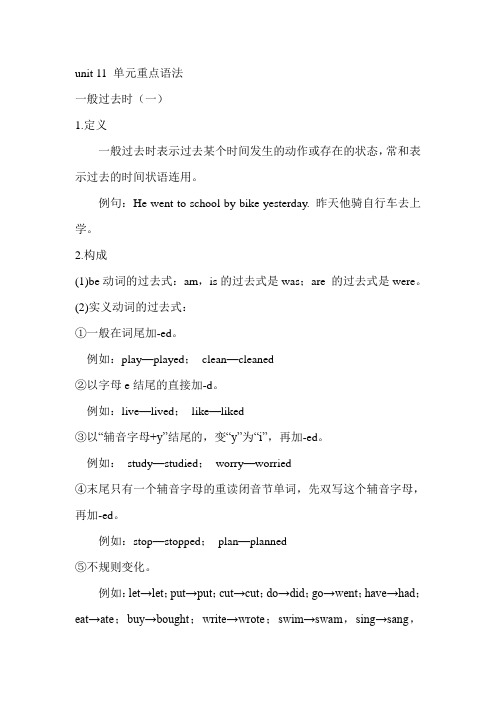
unit 11 单元重点语法一般过去时(一)1.定义一般过去时表示过去某个时间发生的动作或存在的状态,常和表示过去的时间状语连用。
例句:He went to school by bike yesterday. 昨天他骑自行车去上学。
2.构成(1)be动词的过去式:am,is的过去式是was;are 的过去式是were。
(2)实义动词的过去式:①一般在词尾加-ed。
例如:play—played;clean—cleaned②以字母e结尾的直接加-d。
例如:live—lived;like—liked③以“辅音字母+y”结尾的,变“y”为“i”,再加-ed。
例如:study—studied;worry—worried④末尾只有一个辅音字母的重读闭音节单词,先双写这个辅音字母,再加-ed。
例如:stop—stopped;plan—planned⑤不规则变化。
例如:let→let;put→put;cut→cut;do→did;go→went;have→had;eat→ate;buy→bought;write→wrote;swim→swam,sing→sang,begin→began过去原形加“ed”,词尾有e只加“d”;辅音之后y结尾,y要变i 加“ed”;词尾重读闭音节,双写辅音加“ed”。
过去分词过去式,不按规则也有些。
3.句型(1)含be动词过去时的句型:其否定句是在was/were后加not,其一般疑问句和特殊疑问句是把was/were提到主语前。
例句:—Were you at home yesterday?—Yes,I was./ No,I wasn't.(2)含实义动词过去时的句型:①肯定句:主语+动词过去式+其他.②否定句:主语+did not (didn't)+动词原形+其他.③一般疑问句:Did+主语+动词原形+其他?(其肯定回答用“Yes,主语+did”,否定回答用“No,主语+didn't.”)④特殊疑问句:疑问词+did+主语+动词原形+其他?。
七下英语第十一单元知识点归纳
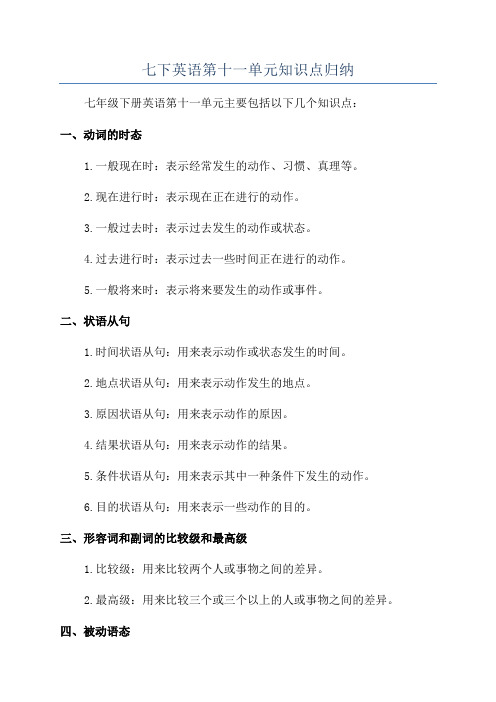
七下英语第十一单元知识点归纳七年级下册英语第十一单元主要包括以下几个知识点:一、动词的时态1.一般现在时:表示经常发生的动作、习惯、真理等。
2.现在进行时:表示现在正在进行的动作。
3.一般过去时:表示过去发生的动作或状态。
4.过去进行时:表示过去一些时间正在进行的动作。
5.一般将来时:表示将来要发生的动作或事件。
二、状语从句1.时间状语从句:用来表示动作或状态发生的时间。
2.地点状语从句:用来表示动作发生的地点。
3.原因状语从句:用来表示动作的原因。
4.结果状语从句:用来表示动作的结果。
5.条件状语从句:用来表示其中一种条件下发生的动作。
6.目的状语从句:用来表示一些动作的目的。
三、形容词和副词的比较级和最高级1.比较级:用来比较两个人或事物之间的差异。
2.最高级:用来比较三个或三个以上的人或事物之间的差异。
四、被动语态1. 被动语态的基本构成:be + 过去分词。
2.被动语态的用法:表示动作的承受者或行为的对象,强调动作的发生而不强调动作的执行者。
五、情态动词1. can:表示能力或许可。
2. must:表示必须或肯定。
3. may:表示可能或许可。
4. need:表示需要。
5. should:表示应该或建议。
6. would like:表示意愿。
六、宾语从句1.宾语从句是一种名词性从句,充当宾语的作用。
2. 宾语从句的引导词有that, if, whether等。
七、祈使句1.祈使句用来表示命令、请求、建议、劝告等。
2.没有主语,动词用原形。
以上就是七年级下册英语第十一单元的主要知识点归纳。
在学习中,我们要掌握动词的时态,熟练运用状语从句,掌握形容词和副词的比较级和最高级的用法,了解被动语态的构成和用法,掌握情态动词的用法,能够正确使用宾语从句和祈使句。
通过练习和巩固这些知识点,可以提高英语表达能力。
人教版七年级下册英语Unit11知识点
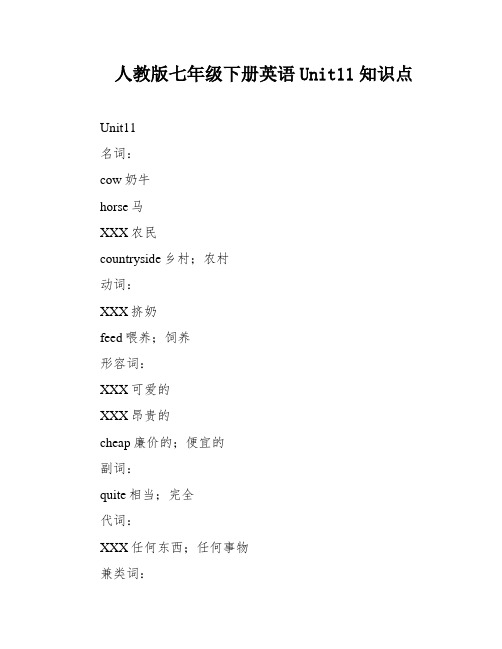
人教版七年级下册英语Unit11知识点Unit11名词:cow奶牛horse马XXX农民countryside乡村;农村动词:XXX挤奶feed喂养;饲养形容词:XXX可爱的XXX昂贵的cheap廉价的;便宜的副词:quite相当;完全代词:XXX任何东西;任何事物兼类词:farmn农场v务农;种田短语:milk a cow给奶牛挤奶ride a horse骑马feed chicken喂鸡quite a lot(of……)许多in the countryside在乡下;在农村XXX消防站常识点:1、milk牛奶(名词)→milk挤奶(动词)rain雨(名词)→rain下雨(动词)water水(名词)→water浇水(动词)plant植物(名词)→plant种植(动词)all in all总的说来be interested in对……感兴趣go for a walk = take a walk去漫步go on a trip = have a trip加入游览in the dark在黑暗中come out(太阳、星星、玉轮)呈现;暴露;出书worryv&n忧郁;担心XXX(的)everything所有事物;一切XXX昨天luckily幸运地;好运地slow迟钝的;迟钝的interested感兴趣的dark黑暗的;昏暗的excellent极好的;优秀的exciting使人兴奋动物;令人激动的pick采;摘XXX听到;听见grow种植;生长;发育flower花sun太阳XXXfire火;火警painting油画;绘画robot机器人guide导游;向导gift礼品;赠品2、feed豢养;豢养Can you help me feed my dog?你能帮我喂狗吗?(1)XXX……把……喂给……You can XXX.你可以把坚果喂给这个猴子吃。
(2)feed……(on)……用……喂……You can XXX(on)nuts.你可以用坚果喂猴子。
人教版七年级下册unit 11单元考点归纳
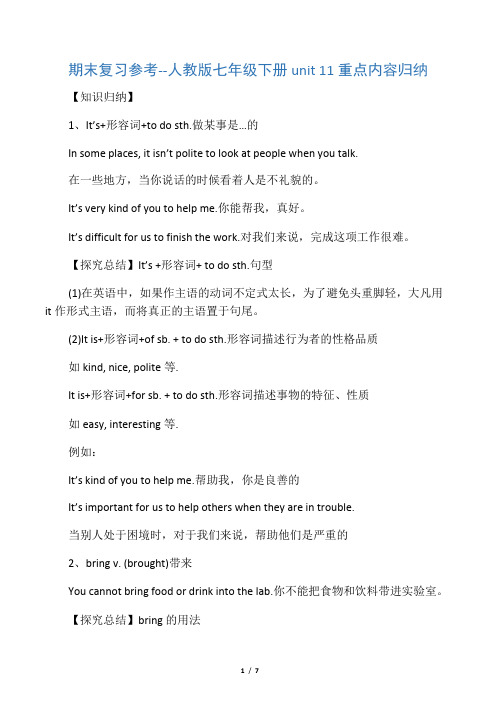
期末复习参考--人教版七年级下册unit 11重点内容归纳【知识归纳】1、It’s+形容词+to do sth.做某事是…的In some places, it isn’t polite to look at people when you talk.在一些地方,当你说话的时候看着人是不礼貌的。
It’s very kind of you to help me.你能帮我,真好。
It’s difficult for us to finish the work.对我们来说,完成这项工作很难。
【探究总结】It’s +形容词+ to do sth.句型(1)在英语中,如果作主语的动词不定式太长,为了避免头重脚轻,大凡用it作形式主语,而将真正的主语置于句尾。
(2)It is+形容词+of sb. + to do sth.形容词描述行为者的性格品质如kind, nice, polite等.It is+形容词+for sb. + to do sth.形容词描述事物的特征、性质如easy, interesting等.例如:It’s kind of you to help me.帮助我,你是良善的It’s important for us to help others when they are in trouble.当别人处于困境时,对于我们来说,帮助他们是严重的2、bring v. (brought)带来You cannot bring food or drink into the lab.你不能把食物和饮料带进实验室。
【探究总结】bring的用法(1)bring作动词用,意为“带来”,其过去式为brought常构成短语:bring sb. sth. = bring sth. to sb.意为“给某人带来某物”bring up意为“养育”。
(2)bring, take, carry与get的用法辨析:bring表示从别处把某人或物“带来”或“拿来”take指把某人或物“带走”或“拿走”(到别处)carry指“搬运”,不详尽说明来去的方向,有时含有惨重或麻烦之意get指到别处把某物取来,相当于go and bring3、each pron.各个,每个In the US some people shake hands, and some kiss or hug each other.在美国,有些人握手,有些人亲吻或彼此拥抱。
人教版英语七年级下册Unit 11 单元知识点
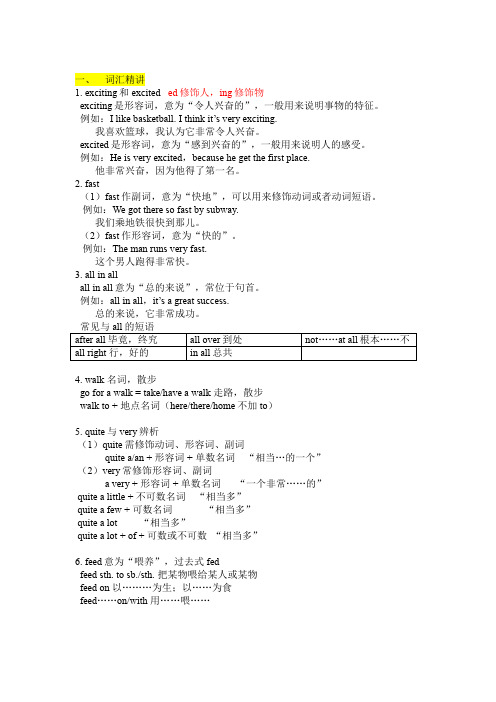
一、词汇精讲1. exciting和excited ed修饰人,ing修饰物exciting是形容词,意为“令人兴奋的”,一般用来说明事物的特征。
例如:I like basketball. I think it’s very exciting.我喜欢篮球,我认为它非常令人兴奋。
excited是形容词,意为“感到兴奋的”,一般用来说明人的感受。
例如:He is very excited,because he get the first place.他非常兴奋,因为他得了第一名。
2. fast(1)fast作副词,意为“快地”,可以用来修饰动词或者动词短语。
例如:We got there so fast by subway.我们乘地铁很快到那儿。
(2)fast作形容词,意为“快的”。
例如:The man runs very fast.这个男人跑得非常快。
3. all in allall in all意为“总的来说”,常位于句首。
例如:all in all,it’s a great success.总的来说,它非常成功。
4. walk 名词,散步go for a walk = take/have a walk 走路,散步walk to + 地点名词(here/there/home不加to)5. quite与very辨析(1)quite需修饰动词、形容词、副词quite a/an + 形容词 + 单数名词“相当…的一个”(2)very常修饰形容词、副词a very + 形容词 + 单数名词“一个非常……的”quite a little + 不可数名词“相当多”quite a few + 可数名词“相当多”quite a lot “相当多”quite a lot + of + 可数或不可数“相当多”6. feed意为“喂养”,过去式fedfeed sth. to sb./sth. 把某物喂给某人或某物feed on 以………为生;以……为食feed……on/with 用……喂……7. How + be + 事物名词的用法?how意为如何,怎样●身体情况 How is your grandmother?●方式、方法 How did you come back home last night?●天气情况 How is the weather in Shanghai today?●程度 How do you like the book?8. show作动词,展示;show sth. to sb. = show sb. sth. 给某人展示某物作名词,节目;TV show电视节目;talk show访谈节目9. anything 任何东西;任何事物;常用于否定句或疑问句●anything作主语时,谓语动词用单数形式●形容词修饰不定代词something,anything时,形容词后置●something常用于肯定句中,但表示请求、建议、征求意见等,希望得到肯定回答的疑问句中常用something。
人教版英语七年级下册第十一单元短语语法知识点总结

Unit 11 How was your schooltrip?【短语归纳】1. go for a walk 去散步2. milk a cow 挤牛奶3. ride a horse 骑马4. feed chickens 喂小鸡5. talk with 与…谈话6. take photos 拍照7. quite a lot 相当多8. show …around 带领…参观9. learn about 了解 10. from... to... 从...到... 11. grow/pick strawberries 种植 /采草莓13. in the countryside 在乡下 14. go fishing 去钓鱼 15. at night 在夜晚 16. a lot of 许多;大量 17. come out 出来 18. go on a school trip 去学校郊游 19. along the way 沿线 20. after that 之后 21. buy sth. for sb. 为某人买某物 22. all in all 总的来说23. take a / the train 乘火车 24. be interested in 对……感兴趣 25. not … at all 根本不…… 用法集萃】1. How + be …? + like? 怎…么…样?2. too many + 可数名词复数 太多的……3. teach sb. how to do sth. 教某人怎样做某事4. quite + a / an + 形容词 +可数名词单数 = a + very + 形容词 I 语法探究丨 -般过去时态I定义:表示 ____________ 某个时间或某一段时间内发生的动作或存在的状态。
时间状语: _______________ (昨天), _________ (去年), ______________ (三天前 ),______________________ (刚才 ), __________ (在 2000年)等。
(完整版)最新人教版七年级下册英语Unit11所有知识点、句型精学笔记

七年级英语unit11精学笔记精学要求1.每个例子后面要对子互讲。
2.每一知识点,都要求互检互签,互检在知识点的右侧空白处签上检查人员的名字。
精学笔记基础知识一单词1挤奶 ________ 2奶牛_________3马_______ 4喂养_______5农民_________ 6相当,完全_____ 7任何东西_______8种植,生长________9农场_______ 10采摘________11极好的;优秀的__________ 12乡村;农村___________13昨天___________ 14花__________ 15担心________ 16幸运的_______17太阳_________18火灾_____________19博物馆_________ 20油画________21使人兴奋的__________22可爱____________23昂贵的____________24便宜的______________25缓慢的___________ 26快的_______27机器人_______28导游_______29礼物_______30所有事物___________31感兴趣的_____________ 32黑暗的_________ 33听见__________知识点一精炼:1.—What’s your father’s job?--He’s a _______(farm).2.There are some ___ and ___ in the fridge(冰箱)。
A .tomatos ; milk B. tomatos ; milksC. tomatoes ; milkD. tomatoes ; milks互检互签__________基础知识二:短语1去散步______________ 2给奶牛挤牛奶______ ____ ______3骑马_________________ 4喂鸡__________ _____________5与......谈话__________________ 6拍照_______ _____ ________7相当多;许多_______ _____ ____ 8带领......参观_______________ 9了解___________________知识精练:1.Mr.Li gave me too much help this time.(改写同义句)Mr . Li helped me ______ ______ ______ this time.2.We showed our press cards(采访证)__the old man , and then he showed us _____ his old house happily.A . to ; to B. with ; aroundC . to ; aroundD . with ; to10.从...到..._______________11.种植草莓_________________12.采草莓___________________ 13.在乡下___________________ 14.去钓鱼________________ 15.在晚上__________________ 16.许多;大量________________ 17.出来_______________ 18.学校郊游________________知识点精练1.Hanhan is a popular writer . His new book will _____ soon .A . come up B. come inC . Come out D. come on2.He _____ last weekend .A. went fishB. goes fishC. goes fishingD. went fishing19.沿着这条路________________20.之后______________ 21.为某人买某_________________ 22.总的来说__________________ 23.乘火车______________________ 24.对...感兴趣________________ 25.根本不...__________________知识精练1.根据句意完成句子父亲节快到了,我想给父亲买些礼物Father’s Day is coming . I want to___________________________2.I am interested ____ sports . I often play soccer and I am ____ a soccer team .A . in ; in B. in ; on C. at ; in D. at ; on互检互签_______________知识点1:一般过去时的用法表示过去某个时间发生的动作或存在的状态,常和表示过去的时间状语连用.标志词:_________, ___________, _________等,要用动词的过去式。
人教版七年级下册英语Unit 11 知识点语法归纳总结

人教版七年级下册英语Unit 11 知识点语法归纳总结2)We went for a walk in the countryside.我们在乡下散步。
3)I XXX.我了解了如何挤牛奶。
4)XXX farm.我们在农场骑马、喂小鸡。
5)XXX families.我们采摘了草莓,为家人买了一些。
6)After that。
XXX us around the farm.之后,我们的导游带领我们参观了农场。
7)All in all。
it was a great school trip.总的来说,这是一次非常棒的学校郊游。
I ate quite a lot last night and didn't XXX。
We also saw quitea lot of sheep in the XXX。
I milked a cow.As a noun。
XXX。
For example。
I'd like a cup of milk。
As a verb。
milk means to extract milk from a cow。
For instance。
I helped the XXX.XXX XXX。
XXX。
For example。
she went to the garden and picked some strawberries.Pick up is a fixed phrase that means to XXX something that is on the ground。
The object of pick up can either be placed een pick and up or after pick up。
For instance。
please pick up the wallet or please pick the wallet up。
If the object is a pronoun。
Unit 11 单元知识点总结 七年级英语下册(人教版)
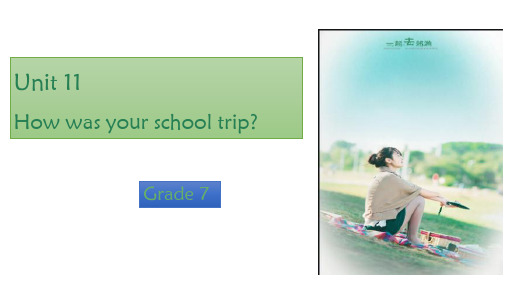
相关链接: 过去式的变化规则
一般直接加-ed
talk→talked jump→jumped
以e结尾直接 加-d
“辅元辅”结尾 的重读闭音节, 双 写后辅,再加-ed
3.——Did you do some shopping last week?
——____________.
A.Yes, I did
B.Yes, I do
C.No, I don’t
4.She often _________to school early, but this morning she _________to school late.
01
Words
luckily, interested…
2.1 milk
01
v. 给…挤奶
milk a cow 给奶牛挤奶
02
n. 牛奶
I help my grandfather to milk the cow.
Would you like coffee or milk?
2.2 worry
vt. 使担心/焦虑 Nothing worries me. vi. 担心/焦虑 worry about sth./sb.
否定句 主语+didn’t+动词原形+… She didn’t have two books.
一般疑问句 Did+主语+动词原形+…? --Did she have two books? 肯定回答:Yes,主语+did. 否定回答:No,主语+didn’t. --Yes. she did. / No, she didn’t.
人教版七年级英语下册第11单元重点知识汇总

Unit11重点单词、知识梳理、词汇句式精讲单词(音标)milk [mɪlk] v. 挤奶cow [kaʊ] n. 奶牛,母牛;母兽milk a cow给奶牛挤奶horse [hɔː(r)s] n. 马ride a horse骑马feed [fiːd] v.(fed/fed)喂养;饲养feed chickens喂鸡farmer ['fɑː(r)mə(r)] n.农民;农场主quite [kwaɪt] adv.相当;完全quitea lot(of…)许多anything ['enɪθɪŋ](常用于否定句或疑问句)任何东西;任何事物grow [grəʊ] v.种植;生长;发育farm [fɑː(r)m] n.农场 v.务农pick [pɪk] v.采;摘excellent ['eksələnt] adj.countryside ['kʌntrɪsaɪd].乡村;农村inthe countryside在乡下;在农村yesterday ['jestə(r)dei] adv.昨天flower ['flaʊə(r)] n.花worry ['wʌri] v.&n.担心;担忧luckily ['lʌkɪli] adv.幸运的;好运的sun [sʌn] n.太阳museum [mjuː'ziəm] n.博物馆fire ['faɪə(r)] n.火;火灾frie station ['steɪʃ(ə)n]消防站painting ['peɪntɪŋ] n.油画;绘画exciting [ɪk'saɪtɪŋ] adj.使人兴奋的;令人激动的lovely ['lʌvli] adj.可爱的expensive [ɪk'spensɪv] adj.昂贵的cheap [tʃiːp] a dj.廉价的;便宜的slow [sləʊ] adj.缓慢的;迟缓的fast [fɑːst] adv.&adj. 快地(的)robot ['rəʊbɒt] n.机器人guide [gaɪd] n.导游;向导gift [gɪft] n.礼物;赠品all in all总的来说everything ['evrɪθɪŋ] pron.所有事物;一切interested ['ɪntrəɪstɪd] adj.感兴趣的be interested in… 对……感兴趣dark [dɑː(r)k] adj.黑暗的;昏暗的hear [hɪə] v.(heard/hɝ:(r)d)听到;听见Carol ['kærəl]卡罗尔(女名)Unit11 知识梳理【重点短语】1. school trip 学校旅行2. go for a walk 去散步3. milk a cow 挤牛奶4. ride a horse 骑马5. feed chickens 喂鸡6. talk with a farmer 与农民交谈7. take some photos 照相8. ask some questions 问一些问题9. grow apples 种苹果10. show sb. around sp. 带某人逛某地11. learn a lot 学到许多12. pick some strawberries 摘草莓13. last week 上周14.In the countryside 在乡村15. visit my grandparents 拜访我的祖父母16. go fishing 去钓鱼17. sound good 听起来很好18. climb the mountains 去爬山19. play some games 玩一些游戏20. visit a museum 参观博物馆21. visit a fire station 参观消防站22.draw pictures 画画23. go on a school trip 去旅行24 visit the science museum 参观科技博物馆25. how to make a model robot 如何制作机器人模型26. gift shop 礼品店27. buy sth. for sb. =buy sb. sth.为某人买某物28. all in all 总得来说29. be interested in... 对…感兴趣30. be expensive 昂贵的31. not...at all 一点儿也不【重点句型】1.---Did you see any cows? 你见到奶牛了吗---Yes, I did. I saw quite a lot. 我见到了而且见到了很多很多2. ---Did Carol take any photos? 罗尔拍照片了吗?---Yes, she did.是的,她拍了。
人教版七年级下册Unit11讲义重要知识点和句型
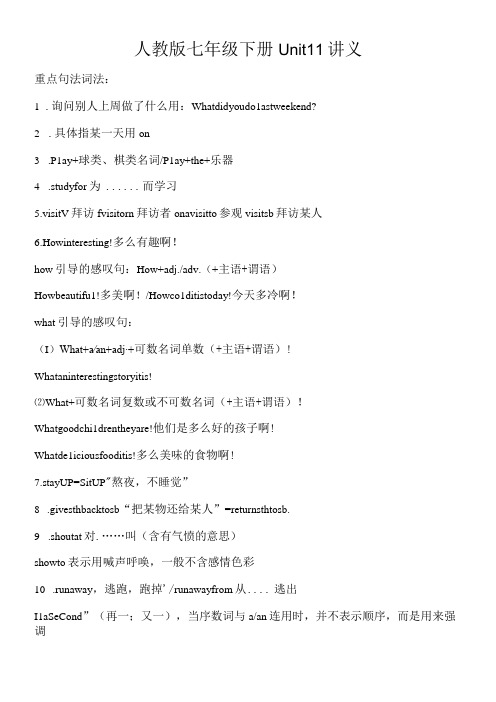
人教版七年级下册Unit11讲义重点句法词法:1.询问别人上周做了什么用:Whatdidyoudo1astweekend?2.具体指某一天用on3.P1ay+球类、棋类名词/P1ay+the+乐器4.studyfor为 ...... 而学习5.visitV拜访fvisitorn拜访者onavisitto参观visitsb拜访某人6.Howinteresting!多么有趣啊!how引导的感叹句:How+adj./adv.(+主语+谓语)Howbeautifu1!多美啊!/Howco1ditistoday!今天多冷啊!what引导的感叹句:(I)What+a∕an+adj∙+可数名词单数(+主语+谓语)!Whataninterestingstoryitis!⑵What+可数名词复数或不可数名词(+主语+谓语)!Whatgoodchi1drentheyare!他们是多么好的孩子啊!Whatde1iciousfooditis!多么美味的食物啊!7.stayUP=SitUP"熬夜,不睡觉”8.givesthbacktosb“把某物还给某人”=returnsthtosb.9.shoutat对.……叫(含有气愤的意思)showto表示用喊声呼唤,一般不含感情色彩10.runaway,逃跑,跑掉'/runawayfrom从.... 逃出I1aSeCond”(再一;又一),当序数词与a/an连用时,并不表示顺序,而是用来强调“再一,又一”12.Practicedoingsth练习做某事/Practicemakesperfect熟能生巧13.sheep(p1)sheep单复数同形的单词有:中国人和日本人爱护绵羊、鹿和鱼ChineseJapanesesheepdeerfish14.anythinginteresting有趣的事当形容词修饰不定代词时,形容词需后置。
15.putup举起,张贴;putaway放好、整理好;puton穿上、上演;putoff推迟;putdown方下;16.so…that'太... 以至于,结构:so+adj./adv+that17.getasurprise.吃惊18.1ookout”小心,当心“1ookoutof"向外看”19.seesb.doingSth“看见某人正在做某事”,强调动作正在进行。
人教版七年级下册英语11单元知识点

人教版七年级下册英语11单元知识点语法:一般过去时(表示在过去某一时间发生的动作或存在的状态)(一)句型1、肯定句①主语+was/were+其它.②主语+动词的过去式+其它2、否定句①主语+ wasn't/weren’t+其它。
②主语+didn't+动词原形+其它。
3、一般疑问句①Was/Were+主语+其它?②Did+主语+动词原形+其它?4、特殊疑问句特殊疑问词+一般疑问句?(二) 动词过去式变化规则①一般情况在动词原形后加-ed。
②以不发音e结尾的加-d。
③以辅音加y结尾的,去y变i加-ed。
④以重读闭音节结尾,末尾只有一个辅音字母,先双写该辅音字母,再加-ed。
⑤不规则单词的过去式需要单独记忆。
重点短语:go for a walk=take a wake去散步milk a cow挤牛奶 ride a horse骑马feed chickens喂鸡talk with sb与…谈话 talk about sth.谈论某事take some photos拍照 quite a lot of相当多show …around带领,参观 learn about了解from… to… 从…到… grow strawberries种植草莓pick strawberries采草莓 go fishing去钓鱼at night在夜晚 in the countryside在乡下a lot of许多;大量 come out出来go on a school trip去学校郊游 along the way沿线after that之后 buy sth. for sb.为某人买某物all in all 总的来说 take a/the train乘火车be interested in 对…感兴趣 not…at all根本不……. How be…? …怎么样?How do/does+主语+ feel about…? 对…感觉如何?too many+可数名词复数 太多…teach sb. how to do sth.教某人怎样做某事quite a/an+形容词+可数名词单数=a very+形容词+可数名词单数 相当/非常be worried 担心。
七年级下册英语11单元知识点总结
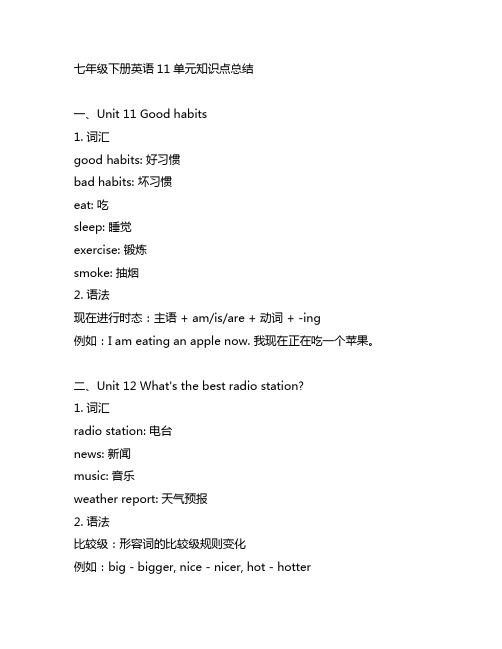
七年级下册英语11单元知识点总结一、Unit 11 Good habits1. 词汇good habits: 好习惯bad habits: 坏习惯eat: 吃sleep: 睡觉exercise: 锻炼smoke: 抽烟2. 语法现在进行时态:主语 + am/is/are + 动词 + -ing例如:I am eating an apple now. 我现在正在吃一个苹果。
二、Unit 12 What's the best radio station?1. 词汇radio station: 电台news: 新闻music: 音乐weather report: 天气预报2. 语法比较级:形容词的比较级规则变化例如:big - bigger, nice - nicer, hot - hotter三、Unit 13 Rainy days make me feel sad.1. 词汇rainy: 下雨的sunny: 晴朗的windy: 有风的cloudy: 多云的2. 语法情景描述: 表达天气情况对情绪的影响例如:Rainy days make me feel sad. 下雨的日子让我感到悲伤。
四、Unit 14 I used to be afraid of the dark.1. 词汇afraid: 害怕的dark: 黑暗的used to: 以前2. 语法used to 结构:表示过去的习惯或经历例如:I used to be afraid of the dark. 我以前害怕黑暗。
五、Unit 15 World champion1. 词汇champion: 冠军competition: 比赛record: 记录win: 赢得2. 语法一般过去时态:主语 + 动词过去式例如:He won thepetition last year. 他去年赢得了比赛。
六、Unit 16 I used to make paper planes.1. 词汇paper plane: 纸飞机toy: 玩具imagine: 想象create: 创造2. 语法used to 和 would 结构的区别used to 表示过去的习惯或经历;would 表示过去的习惯或“总是”如此的状态。
- 1、下载文档前请自行甄别文档内容的完整性,平台不提供额外的编辑、内容补充、找答案等附加服务。
- 2、"仅部分预览"的文档,不可在线预览部分如存在完整性等问题,可反馈申请退款(可完整预览的文档不适用该条件!)。
- 3、如文档侵犯您的权益,请联系客服反馈,我们会尽快为您处理(人工客服工作时间:9:00-18:30)。
Unit 11How was your schooltrip【短语归纳】1. go for a walk去散步2. milk a cow 挤牛奶3. ride a horse 骑马4. feed chickens 喂小鸡5. talk with与…谈话6. take photos拍照7. quite a lot相当多8. show...around 带领...参观9. learn about 了解 10. from... to... 从...到... 11. grow/pick strawberries 种植/采草莓13. in the countryside在乡下14. go fishing去钓鱼15. at night在夜晚16. a lot of 许多;大量17. come out出来18. go on a school trip去学校郊游19. along the way沿线20. after that之后21. buy sth. for sb. 为某人买某物 22. all in all 总的来说23. take a / the train 乘火车 24. be interested in 对……感兴趣25. not… at all 根本不……【用法集萃】1. How + be… + like ……怎么样2. too many + 可数名词复数太多的……3. teach sb. how to do sth. 教某人怎样做某事4. quite + a / an + 形容词+可数名词单数 = a + very + 形容词一个相当 / 很……┃语法探究┃一般过去时态Ⅰ定义:表示__________某个时间或某一段时间内发生的动作或存在的状态。
时间状语: ______________ (昨天),___________(去年), ________________(三天前),_______________________ (刚才), ______________ (在2000年)等。
规则动词的过去式变化:1. 一般情况下在动词原形后+ed。
如:milk →___________;talk →__________;show→___________;pick →___________2. 以不发音e结尾的+d。
如:live → __________ ;hope → __________ ;use → __________ ;arrive→ __________ 。
3. 以重读闭音节结尾的动词,双写末尾仅有的辅音字母,再+ed。
如:stop → __________ ;plan → __________ ;drop → __________ 。
4. 以辅音字母+y结尾的,变y为i+ed。
如:study → __________ ;carr y → __________ ;worry →; __________ 。
不规则动词的过去式变化:①go → ________ ②ride → ________③feed → ________④take → ________⑤do → ________ ⑥say → ________⑦see → ________ ⑧grow → ________⑨eat → ________ ⑩have → ________⑪buy → ________⑫get → ________⑬come → ________⑭draw → ________ ⑮know→ ________⑯ teach→ ________⑰make→________ ⑱swim→________⑲bring → __________⑳cut → ________→ ________ → ________ → ________→ ________→__________→ ________→__________→ ________→ ________→ ________→ ________32. leave → ________→ ________34. lose → ________ → ________→ ________→ ________→ ________ → ________→ ________→ ________→ ________ → _______→ ________→ ________46. stand → ________ 47 tell → ________→ ________单项选择:( )1.My father______ill yesterday.A.isn't B.aren't C.wasn't D.w eren't( )2.______your parents at home last week﹖A.Is B.Was C.Are D.Were( )3.The twins______in Dalian last year.They______here now.A.are; were B.were; are C.was; are D.were; was( )4.______your father at work the day_____yesterday(前天)﹖A.Was; before B.Is; before C.Was; after D.Is; after( )5.—Who was on duty last Friday﹖—______.A.I am B.I was C.Yes, I wasD.No, I wasn't请用正确动词形式填空1. I _________ (have) an exciting party last weekend.2. _________ she _________(practice) her guitar yesterday No, she _________.3. What ________ Tom ________ (do) on Saturday eveningHe ________(watch) TV and __________(read) an interesting book.4. They all _________(go) to the mountains yesterday morning.5. She _________(not visit) her aunt last weekend.She ________ (stay) at home and _________(do) some cleaning.翻译下列句子1. 我过了一个忙碌但却刺激的周末。
I _________ _________ __________ __________ exciting weekend.2. Jenny喜欢看书。
昨晚她看了一本英语书。
Jenny likes _________ __________. She _________ an English book last night.3. Emma每天都看电视。
可是昨天他没有看。
Emma__________ TV every day. But he _________ ________ ________ y esterday.4. 上周六他们做什么了他们做作业和购物了。
What ________ they _________ _________ SaturdayThey _________ __________ homework and _________ __________.5. 今天早上方方得做饭,因为他父亲不在家。
This morning Fangfang ____ ____ ___ ____ because his father ____ _ _____ ____ yesterday.改写句子1、Lucy did her homework at home.(改否定句)Lucy ________ _______ her homework at home.2、He found some meat in the fridge(冰箱).(变一般疑问句)___________ he __________ ___________ meat in the fridge3、There was some orange in the cup.(变一般疑问句)_______ there _______ orange in the cup4. Frank read an interesting book about history. (一般疑问句)_______ Frank _______ an interesting book about history┃能力提升训练┃Ⅰ.完形填空It was Sunday yesterday.Henry wasn't __1__ home. He was on a__2__ to the zoo.An old man got on the bus. Henry stood up and __3__ to him, “Come and sit here, please.” He helped the old man__4__. “Thanks __5__, good boy,” the old man said. “You're welcome,” said Henry.The bus went on. Thirty minutes later, it stopped__6__the zoo. Henry got off the bus and said __7__ to the old man. The old man smiled (微笑) at him in a friendly way.Henry went into the of the people there were students. He__9__ a lot of animals and birds, and he also took many photos. He spent a happy weekend __10__he helpedothers and had a good time in the zoo.( ). in B. on C. at D. of( ). way B. zoo C. bus D. car( ). spoke B. said C. told D. talked( ). go for B. get on C. sit down D. get off( ). a little B. a lotC. a bitD. lots of( ). next B. through C. near D. in( ). hello B. goodbye C. yes D. no( ). Most B. Each C. Every D. nearly( ). found B. looked C. saw D. watched( ). because B. but C. when D. orⅡ. 阅读理解Mr. and Mrs. Jones were going on their vacation (假期) with their children, and they must arrive at the airport before 11:40 the next morning. “It takes us thirty minutes to get there in a car,” Mr. Jones said, “so we must get ready before eleven o'clock. Don't be late.”At ten fifty, all of them were busy doing something, but Mrs. Jones wasn't. She sat quietly in a chair in the garden and enjoyed the good weather.Mr. Jones and the children were surprised, but Mrs. Jones said, “Don't worry! Before I went to bed last night, I made all our clocks and watches twenty minutes ahead (提前). Now we can get to the airport early.”did the Jones family have to be ready before eleven o'clockA.Because they were going to a party.B.Because they must arrive at the airport at 11:40.C.Because they had to go to a town.D.The article didn't tell us.long does it take to go from Mr. Jones'house to the airport by carA. Twenty minutes.B. Thirty minutes.C. Fifty minutes.D. fifteen minutes.. Jones and the children were ________when they saw Mrs. Jones sitting in the garden.A. sadB. happyC. surprisedD. angrydid Mrs. Jones sit quietlyA.Because she made all the clocks and watches ahead and they wouldn't be late.B.Because she didn't like to spend her vacation.C. Because she wanted to stay at home.D. Because she though twenty minutes was enough.time was it in fact (事实) when Mr. Jones and the children were busy doing thingsA. It was ten fifty.B. It was eleven ten.C. It was ten thirty.D. It was eleven twenty.。
